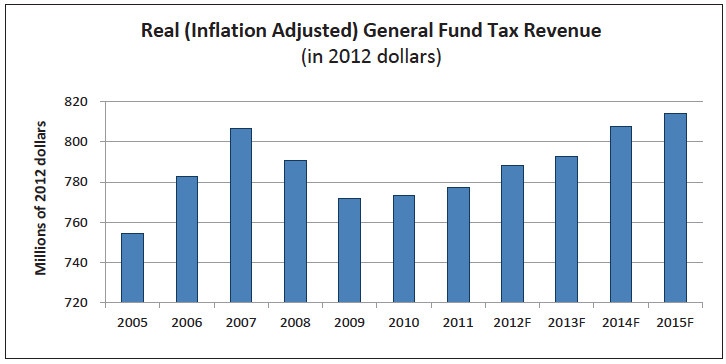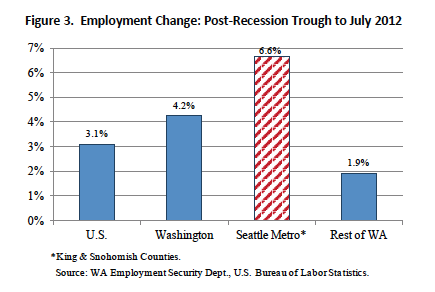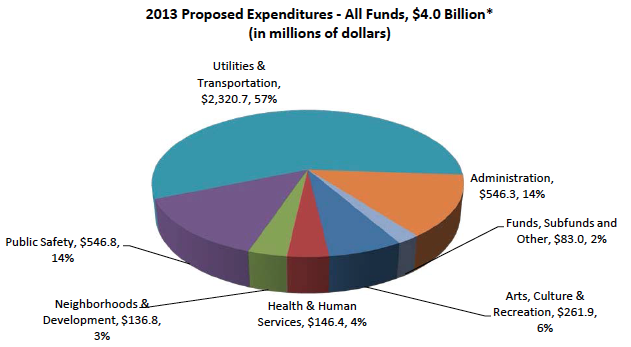Following two years of hard times and cutbacks, city and county leaders brought happier forecasts to the table Monday with new budgets that officials say reflect a sunnier outlook for the Puget Sound. For Capitol Hill, the 2013/2014 financial plan for the city is the first time where operational line items for the First Hill Streetcar appear as well as new revenue from changes at the Volunteer Park Conservatory. Both, it should be noted, present opportunities for trimming back — or at least not spending more — as the city looks to leverage the economic recovery.
Here’s what Mayor Mike McGinn had to say about the improving economic climate:
But there are indications that the degree of the City’s financial challenges is easing as the distance from the end of the Great Recession grows. Forecasts suggest that the rate of real (inflation adjusted) revenue growth is slowly increasing, with the City’s general tax revenues forecast to return to their prerecession peak (2007) by 2014. In fact, in nominal terms, the pace of general tax revenue growth isprojected to pick up in 2014 to 4.4% relative to 2013. While still not at the 7% rate of previous postrecessionaryperiods, this rate of nominal growth is rising as compared with rate of growth over the past couple of years.
You can read his office’s full statement on the 765-page document (embedded below!) here. Meanwhile, the Seattle Times is already a little freaked out by King County Executive Dow Constantine’s plan to impose a $20 car fee in unincorporated areas of the county to fix roads.
In addition to rising revenue forecasts, the City of Seattle also says employment statistics look better for our area than the rest of the country.
Here, by the way, is how the City’s plan to spend our $4 billion breaks down:
Capitol Hill-focused highlights from the 2013-2014 proposed City of Seattle budget are below. We’ll see how things shake out by the time City Council — and everybody else — has their say in November when the budget is finalized.
- The First Hill streetcar plays a small but interesting role in the new budget proposal with a nearly $5 million line item for 2014 operations. The good news for the city: Sound Transit pays for that —
The 2013-2014 Proposed Budget increases appropriation authority in 2014 to reflect the anticipated expenditures for the operations and maintenance of the new First Hill Streetcar line, which is expected to be operational beginning in the second quarter of 2014. These costs will be fully supported by Sound Transit revenue, as detailed in an interlocal agreement. The City in turn will contract with King County Metro Transit to operate the new First Hill Streetcar line.
Overall, the budget proposal includes $5 million in city spending to extend rail transit service in the city. Also not part of that: Federal money coming to study the extension of the First Hill Streetcar beyond its currently planned Denny terminus. More on that soon.
- How about thousands to develop rapid transit along Madison? Seattle Transit Blog wrote about the possibilities here a year ago. The 2013/2014 budget has a line item to help make it happen.
Using one-time fund balance from the Bridging the Gap Levy, the 2013-2014 Proposed Budget adds $350,000 in 2013 and $500,000 in 2014 to the Transit Corridor Improvements project, which implements projects that improve transit speed, reliability, access, and convenience, consistent with the Transit Master Plan. This funding will be specifically focused on the Madison corridor as identified in the Transit Master Plan. This funding will support conceptual design work and environmental review of the corridor.
- Seattle Bike Blog highlights the budget proposal’s line items impacting the future of cycling in the city including a downtown bicycle network.
- Volunteer Park Conservatory’s new entrance fee is forecast to generate $100,000 to help operate the facility:
The fee changes in 2013 include a new $4 admissions fee at Volunteer Park Conservatory, increased fees at the Langston Hughes Performing Arts Center (LHPAC) based on the new renovations, and fees for the new Challenge Course at Camp Long. The fee at Volunteer Park Conservatory is estimated to generate an additional $100,000 annually, which will be used to cover ongoing maintenance costs at the facility. The fee increases at LHPAC are anticipated to generate about $30,000 in 2013 based on the estimated increase in usage of the building. Although LHPAC is being transferred to the Office of Arts and Cultural Affairs, Parks will continue to collect and process revenues associated with LHPAC in 2013. The new Challenge Course is expected to generate an additional $55,000 annually.
- Public safety spending: 10 more cops and, possibly, a $1 million gunshot locator system are in the proposal.
- Some new or changed fees are in the offing. It’s about time those damn swimmers paid their fair share, we say.
The 2013-2014 Proposed Budget also achieves General Fund relief through adjustments to fee-based revenues, including:
Swimming Pool Fees: The Parks Department will generate $300,000 in revenue through modest increases in swimming pool fees, bringing those fees to levels that are comparable with other regional swimming pool facilities.
Parking Fees at City-Owned Garages: The Department of Finance and Administrative Services (FAS) will increase the parking rates at the SeaPark and Seattle Municipal Tower parking garages to bring the rates more in line with market rates. This change will generate $235,000 annually in revenue.
Seattle Animal Shelter Fees: FAS makes a number of changes t how fees are collected by the Seattle Animal Shelter, which will collectively result in a $220,000 annual increase in revenues. As part of this plan, the Seattle Animal Shelter (SAS) will implement a Pet License Partnership program, which will further enhance and coordinate pet license sales efforts in Seattle by encouraging people to license their pets. There are an estimated 250,000 unlicensed pets in Seattle. To reduce the feral cat population, in Seattle, SAS proposes to exempt the pet licensing requirement for feral cats that are brought into the shelter for sterilization. This change is expected to bring in an extra $15,000 annually in fees charged for spaying and neutering cats.
Fire Marshal Fees: The Fire Marshal’s Office, which charges for fire prevention services to direct service users, is adjusting its fees in 2013 and beyond in an attempt to move toward a full-cost recovery model over time for these service-based fees.
- The Capitol Hill branch of the Seattle Public Library gets cash for a “modest” refurbishment in the plan.
- $276,000 will help add hours of operation at Miller Community Center after repeated cutbacks.



